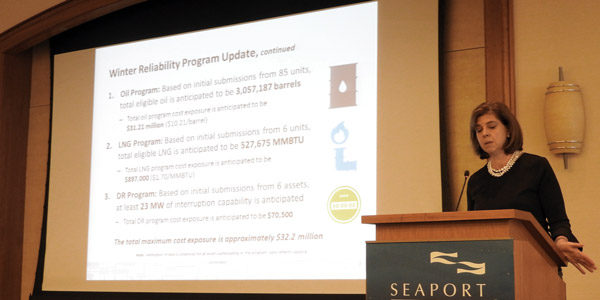BOSTON — New England appears poised to withstand another winter of tight natural gas supplies, an ISO-NE official told the RTO’s Consumer Liaison Group meeting on Thursday. Other speakers debated whether states’ renewable portfolio standards are demanding enough to meet climate goals.
Anne George, ISO-NE vice president of external affairs and communications, said the 342,000-dekatherm Algonquin Incremental Market project just went online, and while it’s primarily meant to serve local distribution companies’ natural gas customers, it should ease system constraints for power generators.
“But as we see [the 1,517-MW] Brayton Point station retire [next June], we see the additional gas capacity going away as a large non-gas resource will likely be replaced by more gas generation,” she said.
Overall consumer costs for electricity have remained relatively flat for New Englanders over the past six years, even as more charges have been added to the distribution side of the bill. Electric distribution companies and their customers are responsible for funding public policy as renewable standards, including the cost of solar carve-outs, energy efficiency and other programs grow, said Jim Bride, president of Boston-based Energy Tariff Experts.
“Transmission charges have gone up a lot. So, there’s this increasing cost wedge, whether it’s renewables or other mandated charges over transmission that’s taken up a greater portion of the bill. What has allowed that to happen without consumers really noticing is the decrease in natural gas prices. Wholesale market power costs are down significantly,” he said.
Massachusetts lawmakers abandoned an effort to increase the state’s RPS this year to further reduce greenhouse gas emissions.
Ron Gerwatowski, an advisor on energy policy and utility regulation and former assistant Massachusetts energy secretary, said the renewable energy credit market that has driven clean energy projects needs further study and more recent data, noting that complete regionwide figures are about three years old. Another area worth more study is the impact of high alternative compliance payments in Massachusetts. The $67 cap draws RECs away from neighboring New Hampshire, Connecticut and New York, potentially leaving them short of meeting their own goals.
“Will an increase in annual obligations really achieve emissions reductions? Or, will it just cause a reshuffling of where the RECs are sold over time? I’m not suggesting we eliminate the RPS … but we really do need a comprehensive study before states consider raising them,” he said.
Greg Cunningham, vice president and director of clean energy climate change for the Conservation Law Foundation, said the two largest New England states, Massachusetts and Connecticut, are mandated to reduce greenhouse gas emissions by 80% below 1990 levels by 2050. From that, the Integrating Markets and Public Policy initiative was born to help markets assist all of the states to reach their climate goals.
“We, CLF, have watched as slowly clean energy has been built out, but at a trajectory that doesn’t come close to meeting this essential obligation — that is not only law, but [what] the science dictates we must do — to avoid the worst implications of climate change,” he said.







